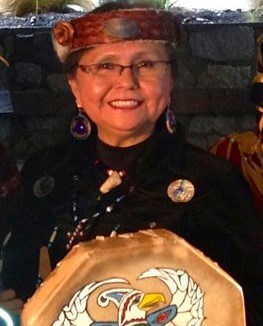Thirty-eight warmhearted, courageous people sat in circle last Sunday at The Gallery and began the messy and glorious business of reconciliation. They shed many tears, laughed a lot, and made a genuine commitment to making a difference. We were honoured by the presence of six Squamish Nation members, one Métis, and four teen-aged boys.
The Blanket Exercise was the first in a series of events for Knowing Our Place: A Reconciliation Initiative. Squamish Nation Elder, Rennie Nahanee and his wife Emma welcomed us on the traditional unceded territory of the Squamish Nation, and were witnesses to the deep sharing that took pace. Wendy Charbonneau, Squamish Nation Elder and storyteller, a direct descendent of Chief George Capilano who welcomed the arrival of both Captain Cook and Captain Vancouver in the late 1700’s, shared stories passed down to her from her Grandmother. She taught everyone the Squamish word for peace: ayás, pronounced “eyes.”
The debriefing circle after the exercise provided a space for the sharing of deep emotions: shame, anger, and sadness at not knowing our true history with Indigenous people; overwhelm at the “avalanche” of losses and regulations restricting the freedom and rights of Indigenous people; the desire to learn more, to experience more ceremony and more circles, to attend Indigenous festivals and celebrations. There was hope expressed for the next generation, and an eagerness to get to know the neighbours. A participant from the United States, expressed gratitude that Canadians had begun this process, which does not exist in her country. One islander came to the painful realization that the apartheid system that took place in South Africa was also taking place in Canada. There was much consideration of our place as we embark on this long-overdue journey of reconciliation.
My new friend, Bird, of the Squamish Nation, brought her three teen-aged sons. They were incredibly attentive and contributed to the conversation in their Squamish language. When someone asked Bird her recommendations for being a good Mom, she answered in three words: time, love, and respect. Powerful words that have guided her for many years. They could also be applied to the circle process: time to share our experiences, love for the work we were doing, and respect for everyone in the room.
I was impressed by the candour of the participants, and gained a new appreciation for my island community. I have participated in the Blanket Exercise before, and each time found it to be a powerful experience. Being in the company of my neighbours was even more heartwarming. Many thanks to all of you who came and participated. I was humbled by your thoughtfulness and vulnerability. And you gave me many creative ideas for future events for Knowing Our Place. At the end of the afternoon, I invited all the participants to tell five others what they learned and experienced so our circle could be extended.
Huge thanks to Kairos Canada for creating the Blanket Exercise, to the Bowen Island Arts Council, the Bowen Island Library, the Bowen Island Literacy Task Group, and the Knick Knack Nook for supporting this initiative. Stay tuned for the next event in Knowing Our Place, Building Bridges Through Art with Squamish Nation artists, and storytellers on May 26th.
P.S.: If someone stops you on the street to tell you about The Blanket Exercise, please take the time to listen and learn. It’s your history.
Ayás.



